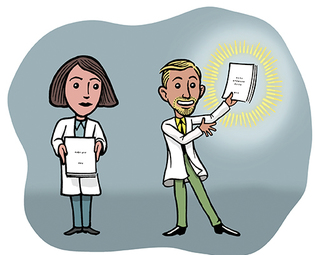 loading
loading
FindingsHe says "unprecedented"; she doesn’tMen in science toot their own horns in their published articles.  Gregory NemecView full imageMale scientists are more likely than female scientists to use self-congratulatory language when they describe their research in published articles—using words like “unique,” and “unprecedented.” School of Management sociology professor Olav Sorenson and two colleagues discovered this tendency by searching for 25 positive terms in the titles and abstracts of articles on clinical and life sciences research. In all, they analyzed 6.3 million articles published from 2002 through 2017. Most of the writers avoided self-congratulation; only 12 percent used any kind of spin. But among those who did, male authors were 12 percent more likely than their female counterparts to use positive terms to describe their results. In the most influential journals, the difference nearly doubled: males were 21 percent more likely to use positive words. That language affected “downstream” citations. According to the study, published in the BMJ, scientists cited publications that used positive language 9 percent more often than they cited articles overall—and in the most prestigious journals, 13 percent more often. Such citations attract attention to research and provide credibility for scientists seeking funding and promotions. Thus, women’s tendency to undersell their work (or men’s tendency to promote theirs) may perpetuate the pervasive gender inequities in the sciences. The effects of spin likely extend beyond science, says Sorenson. “We suspect that this type of self-promotion occurs in lots of contexts ”. The New York Times published an op-ed by the researchers—headlined “Men Call Their Own Research ‘Excellent’”—that attracted 282 comments. The commenters were divided on whether women should brag more or men should tone it down.
The comment period has expired.
|
|